- Home
- Gayle Forman
We Are Inevitable Page 3
We Are Inevitable Read online
Page 3
The basement is split in two. The chaotic side of the room contains the messy Mom Jumble: a dozen haphazardly packed boxes of all the stuff she left behind. The sleeve of the rainbow bathrobe we used to call Joseph sticks out of one box. Her Mr. Coffee out of another. The collection of books on addiction she and Ira read together—maybe the one time when books failed him—sits in a crate in the corner next to Mom’s ancient Schwinn.
Ira has offered to ship her some of her stuff, but she says she moves around too much. This is true, but I don’t think that’s the reason. When she left, it was like she needed to amputate herself from every shred of what had been our life. Her clothes, her books, her bike.
Ira.
Me.
The other side of the basement is neat and spartan. On the wall hang a dozen pine bins, locked. The one and only key is in my pocket.
Mom used to say that money problems are really math problems. Rehab stint number one: Sandy’s college savings. Wilderness program: a second mortgage on the store. Rehab stint number two: my college savings.
I wonder if Sandy operated by a similar logic. Ten bags of heroin: Mom’s SLR camera. Twenty tabs of oxy: my laptop computer. A handful of fentanyl patches: Ira’s prized signed first edition of Ken Kesey’s Sometimes a Great Notion.
I pull the key out of my pocket and open the first bin, which is alphabetically the last, X–Z: X, X Ambassadors, X-Ray Spex, XTC. And so on. According to the laminated index nailed to the inside of the door, there are 167 pieces of vinyl in this bin alone, a fraction of Sandy’s collection.
I open the other eleven bins, one by one. I run my hand across the top of outer plastic sleeves, sharp, meticulously straight, like a military formation. This is his legacy, the one thing Sandy refused to destroy, the thing he loved more than any of us.
Find a way to increase your income, Dexter said.
There are 2,326 records down here.
Money problems are just math problems, Mom said. I lock the bins and shove the one and only key back in my pocket.
You gotta promise me, Sandy said.
The three voices clash in my head as I climb back to the ash heap of our store. This is my brother’s true legacy.
* * *
But can I do it?
I ask myself this as I sit across from Ira, eating spaghetti from a box with sauce from a jar and parmesan cheese that tastes like sawdust. Can I sell of some Sandy’s records to get out of the crater he created? After what he did. After what I did.
“How are your friends?” Ira asks.
It takes me a second to remember Ira thinks I was chilling with friends this afternoon as opposed to hanging out with a CPA.
“Good, good,” I lie.
I’ll find a music club, the kind full of people like Sandy. I won’t sell all of them. Just enough to cover the mortgage payment for a few months, get us back on our feet. A few hundred. He’d barely notice.
(He would totally notice.)
“In fact,” I tell Ira, the idea taking root because I guess I can do it, “I’m going out with them tonight. If it’s okay to take the car.”
“Oh, that’s nice,” he says, even though it’s November 2 and even if I still had friends, none would be home on break now.
But that’s what Ira does. Trusts people. It’s his downfall.
* * *
The nearest musical venue is a club called the Outhouse, though it’s a “club” like the coffee served at C.J.’s is “fine Italian roast.” (It’s Folgers. I’ve seen the cans.) It’s basically a converted garage with a bare-bones bar and some fold-up plastic tables for merch sales.
I get there and case the joint, pay my cover, then come back to the Volvo, lift the hatch, pull out a crate, and set it on the curb. I can’t bring it inside. It weighs a ton. But what am I supposed to do? Announce “Vinyl for sale” like the salesman in Caps for Sale, the first book Ira says he ever read to me (in utero, the day Mom’s pregnancy test came back positive)? Do I flash my goods, like those guys in movies who hide a trove’s worth of stolen jewels in their trench coats? Given it’s mostly women hanging outside the club, I’m not sure how well that would go down. Do women even collect records, or is it more of a guy thing? Like serial killing.
If Sandy were here, he’d know exactly what to do. He had Ira’s memory for things like printings and value. Not to mention his radar. We’d be driving and he’d shout to stop the car at a particular yard sale, even though it looked like the dozens of similar ones we’d just passed. But Sandy somehow knew that at this sale, behind the rusted lawnmower, would be a box of records, and in that box, amid the Andrea Bocellis and Barry Manilows, a rare ten-inch bootleg of the Who. From inside the club, I hear the feedbacky blare of guitar. My head starts to throb. What was I thinking? I can’t do this. For so many reasons. I open the hatch, replace the crate, and lay the blanket on top of it.
“Hey, I know you.”
I turn around but don’t see anyone.
“Down here, dawg.”
And that’s when I see Chad Santos. Chad was a couple grades ahead of me in school, one of those beery, cheery snowboarder bros who went around high-fiving and saying things like, “Just living my best life.” A few years ago, Chad flew off a cliff while snowboarding, broke his back, and wound up in a wheelchair. Not living his best life anymore, is he?
“You here to see Beethoven’s Anvil?” Chad asks.
“The what now?”
“Beethoven’s Anvil.” Chad grins. “I’ve never seen any other guy from our town at one of their gigs.”
“Oh, I’m not here to see them.” I try to close the hatch, but Chad has angled himself in the way. “Sorry, do you mind?”
Chad peers into the Volvo. “What you got there?”
“Nothing.”
Chad reaches in and pulls off the blanket. “Those records?”
“No.”
“They look like records.”
“I mean, they are. But they’re not mine.”
“Are they Sandy’s?”
At the mention of my brother’s name, my heart ricochets, as if someone has reached into my chest and yanked it.
“You are Sandy’s brother, right?” Chad asks. “Sorry, I don’t remember your name.”
When I don’t answer, Chad sticks out his hand. He’s wearing high-tech fingerless gloves, fraying at the seams. “I’m Chad.”
“I’m Aaron,” I manage.
“Aaron, right. Man, I can’t remember the last time I saw you.”
I can. Junior year. I was walking home from school with Susanna Dyerson. We’d bonded over our mutual love of The Sorrows of Young Werther and our literary talks had progressed to makeout sessions in the woods, which was where we were headed when Chad and his bros drove by, pelting me with empty beer cans. It was, as things went back then, a minor humiliation. Except then Susanna suddenly remembered she had to go home and after that she just wanted us to be friends.
“Always a pleasure catching up with you, Chad.” There’s enough sarcasm in my voice to peel the enamel off my teeth, but Chad doesn’t seem to notice. He just grins and bobs his head and refuses to get out of the way.
“So if you’re not here for Beethoven’s Anvil, tell me you’re not here for the Silk Stranglers?” He shakes his head in profound disappointment. “They’re trash.”
“I’m not here to see Silk Strangers or the Beethoven’s Hammer.”
“Anvil,” Chad corrects.
“Them either.”
He cocks his head to the side. “Then what are you doing here?”
“Leaving.” I close the hatch and pull my keys out from my pocket, maneuvering around Chad. “Good seeing you,” I lie. “Take care.”
“Hold up, dawg.” Chad wheels after me. “Why don’t you stick around? Beethoven’s Anvil is high-key cool. And tell you what, if you don’t like the
m, I’ll pay you back your cover charge.” I step to the right, unsure why Chad is being so insistent, except maybe to prank me. Chad angles his chair to his left, blocking my way. “You’re gonna love them.”
“What makes you say that?”
“Well, you’re Sandy’s brother, aren’t you?”
I was. But not anymore. And never like that.
“See you around, Chad.” I push past him, forcefully, and get into the car. When I drive away, he’s still on the pavement. I watch him grow smaller in the rearview mirror.
When I get home, I can’t bring myself to stop. When I was younger Sandy told me that the books came to life at night. He meant to frighten me, but I was enthralled by the idea. It’s only now that I’m older, and know it’s not true, that it does scare me.
I keep going, down Main Street, past Jimmy’s, all the way to the other side of town, to the used car lot. The inflatable balloon that dances manically all day is now slumped in a corner. I loop back on Oak Ridge Boulevard, the main commercial drag outside of downtown, where the ValuMart is. It too is dark, the carts tucked in for the night. I keep driving, not realizing where I’m going until I see the hardware store, a small light on in the back.
I park on the empty street and walk through the misty night. It’s almost ten when I tap on the locked door, but Penny Macklemore answers right away, smiling, as if she’s been expecting me all along.
The Rules
My parents met because of books. I exist because of books. Really.
Ira had discovered the miracle of twenty-six letters so precociously that when in sixth grade all the students had to stand up and claim what they wanted to do when they grew up, Ira announced he wanted to read. His teacher told him that wasn’t a job, unless he wanted to become a literature professor. Ira was halfway through a PhD program in comparative lit when he realized that a love of books did not equal a love of academia. He hated the politics in his department, the squabbling, the push to publish. He didn’t want to publish. He wanted to read. Maybe his sixth-grade teacher had been right, and that wasn’t a job.
Ira drove cross-country, hoping to figure out what he wanted to do. He stopped at every thrift store, every estate sale, every library sale he came across, collecting books all the way. By the time he’d reached the northwestern tip of Washington, he had about four hundred books—and no idea what to do with his life. He was on the verge of surrendering back to his program when he saw this woman hitchhiking by the side of the road.
By July, they were married. By September, they’d bought a two-story building on the main street of a small mountain town, with an apartment upstairs and a retail space on the ground floor that they’d sell used books from—those four hundred volumes Ira had amassed would be the inaugural inventory. But right as they were about to open, Mom thought maybe they ought to know a bit more about what they were doing, so she went to what would be the first of many trade shows. That year, all anyone could talk about was a book called The Rules, a sort of retro dating guide that instructed single women how to land a man by essentially hiding all their less-desirable traits until there was a ring on the finger and it was presumably too late to turn back. Mom had a hunch and ordered twenty copies, which sold out almost immediately.
Mom used to joke that she pulled a Rules on Ira, luring him into opening a used bookstore full of dusty classics he could collect, only to make him sell contemporary hits like The Rules and Twilight. But as long as Mom handled all the new books and chatted up the customers, Ira was happy to continue collecting the rare editions and be the human algorithm.
“Yin and Yang,” was how Mom put it.
“Eros and Thanatos,” was how Ira put it.
See?
* * *
For some reason, I’m thinking about The Rules a few nights later when I return from the signing at Penny’s office. Probably because it’s pouring rain, as it will continue to pour rain for the next six to eight months. If anything, it was the Northwest weather that Rulesed Ira.
The year he met Mom had been one of those magical summers when the sun arrives early to the party in May and staggers home, the last to leave, halfway through October. By the time the weather showed its true colors—which is to say singular color, which is to say gray—it was November, and Bluebird Books was up and running. The ring was solidly on the finger.
Ira never loved the dark, gray winters, but after the asteroid, when Yin lost its Yang, when Thanatos went solo, they became unendurable. He’s always cold now, even in summer. The wet gets into his bones. He complains of aching joints, suffers a constant hoarse cough. He sleeps in mittens and thick wool socks. And every night he soaks his feet in the bathtub, trying to get rid of the chill.
This is where I find him tonight, huddled on the ledge of the tub, wrapped in his old Pendleton blanket. When we get out of here, I will take us somewhere warm, where the sun hangs stubbornly in the sky no matter what the calendar dictates. I will reverse-Rules Ira. Trick him into moving somewhere where he will be warm, and if not happy, a little bit less sad.
“Ira, I need to tell you something,” I say right as the landline starts to ring.
“Can you get that?” Ira calls. “It might be your mother.”
Of course it’s Mom. Who else calls on the landline anymore?
I decided not tell Ira what I was going to do before it was done. I wanted it to be too late to turn back. Now it is. And I have to tell him. “I need to speak to you. Now.”
“Can you get the phone first?” We disconnected the answering machine, so the phone continues to ring. She knows we’re home.
“It’s important.”
“Your mother is important.” He says this with all sincerity, no bitterness. He believes we’re still a family. Just a different kind of family.
“Fine,” I grouse. I grab the extension from the kitchen, pick up with a sigh. “Hey, Mom.”
“Aaron, my love . . .”
I’ve read stories about how grief or trauma changes people overnight. Black hair goes gray. Smooth skin goes wrinkled. With Mom, it was her voice. Always strong and clear, if unapologetically off-key when she sang, which was often. The woman on the other end of the line, however, sounds like an old lady, even though Mom’s not yet fifty.
I hear dogs barking in the background. The dogs are new. Which means she’s moved again.
“Where are you now?”
“Silver City, New Mexico, taking care of two dogs, five parakeets, and a pair of cats. The cats are feral, so I just leave them food.”
That’s what she does now, bounces from place to place, pet-sitting. The last time I talked to her, she was minding an epaulette shark in a giant three-hundred-gallon home aquarium in Orlando, Florida.
“How are you feeling, my love?” she asks.
Penny had a fancy fountain pen for me to sign with, but I couldn’t quite seem to get the angle right and there’s a big ink spot on my thumb. I wipe it on my jeans, but it only smears. How I’m feeling is like Lady Macbeth.
“Good, good.”
“And how are things in the store?”
“Same as always,” I say, and though this is nearly always true—Ira’s and my routine is unflaggingly, well, routine—tonight it’s a blatant fiction.
There’s an awkward pause. In the background, I can hear the birdsong.
“What are you reading these days?” Mom asks. In our family, this question is small talk, along the lines of How’s the weather?
“Ira’s reading West Indian authors and he has me on the Central Europeans.”
“The writers with only consonants in their names?”
“Those are the ones. What’s Silver City like?” I hear the glug of the tub draining, meaning Ira is almost done and I can get off the phone.
“The locals call it Silver. It’s nice. A lot of sunshine.”
Ira pads into the room, his fe
et bare, his toes long and fingerlike, white with black hair. He gives me a kiss, his untamed beard tickling my neck. I hand him the phone without saying goodbye.
Her voice fills the air. She’s still talking to me when Ira lifts the phone to his ear. “Hi, Annie. It’s me now.”
“When you get off, I need to speak to you,” I tell Ira.
He nods. “Did you lock up downstairs?”
“Everything’s taken care of.”
He heads toward his bedroom, cradling the handset, tracking wet footprints on the wood. Before he goes into his room, he turns back to me and says, “Thanks for being you.”
This is what he always says to me. And normally I reply, courtesy of Oscar Wilde, “Everyone else was taken.” It’s our longstanding schtick, but tonight, knowing what I just did, I can’t bear to say it.
The Giving Tree
Ira winds up staying on the phone with Mom late into the night, so I don’t have a chance to talk to him. The next morning, when he comes down to open the store, he’s wrecked, his beard seems grayer, his posture more stooped, his thin frame even more depleted.
When I see him like this, I can’t help thinking he’s the human incarnation of The Giving Tree, not just because he’s tall and lanky but because everyone keeps taking chunks out of him. For the life of me I never understood why we housed that book in the children’s section. It belongs in self-help, along with all the other books about dysfunctional relationships. Or maybe in horror.
The steady soaking rain kept up all night, and this morning a new leak has sprung in the ceiling. I fetch another saucepan to catch the runoff, but as I go hunting for a tarp to cover the books, Ira trips over the pan, sending it flying into his shin. “Goddammit!” he yelps, hopping on one foot.
“Sorry,” I say.
“Why are you sorry? You don’t control the rain, do you?”

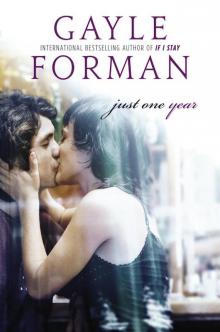 Just One Year
Just One Year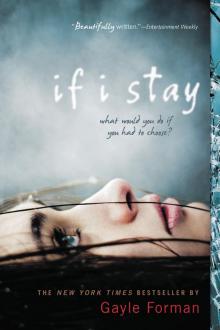 If I Stay
If I Stay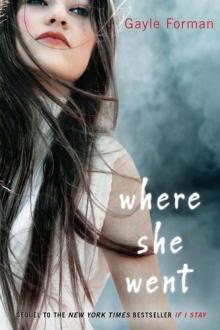 Where She Went
Where She Went Sisters in Sanity
Sisters in Sanity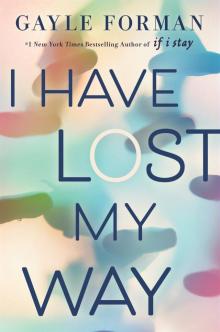 I Have Lost My Way
I Have Lost My Way Just One Day
Just One Day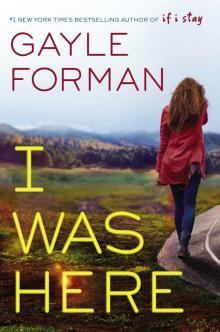 I Was Here
I Was Here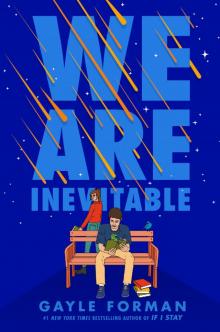 We Are Inevitable
We Are Inevitable Just One Night
Just One Night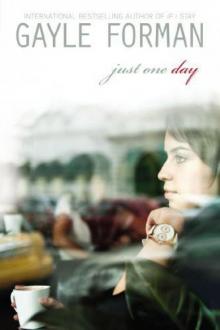 Just One Day jod-1
Just One Day jod-1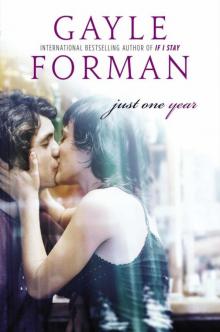 Just One Day 02: Just One Year
Just One Day 02: Just One Year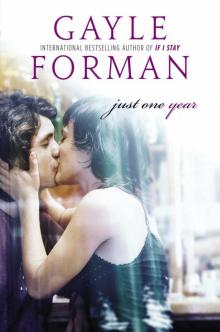 Just One Year jod-2
Just One Year jod-2